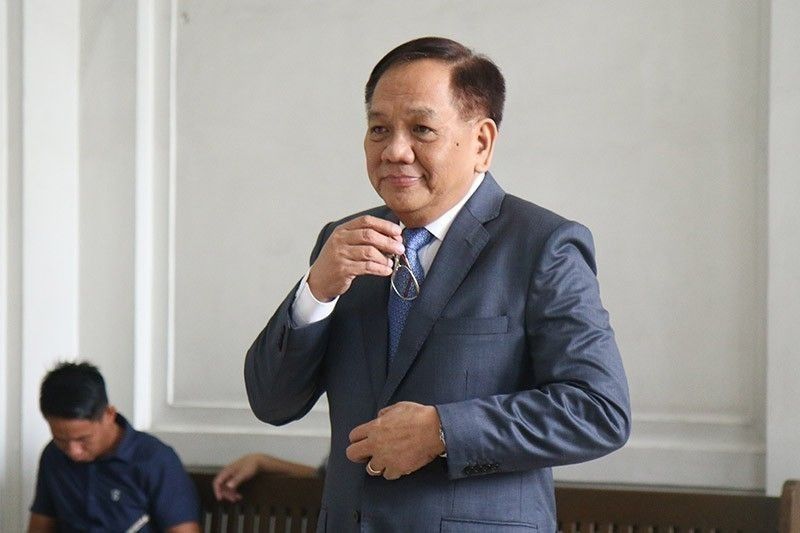At the SC, a leadership change, key innovations

MANILA, Philippines — Another change in leadership took place this year in the Supreme Court (SC), as President Duterte named Diosdado Peralta as the 26th Chief Justice, who would have the longest tenure among all top magistrate appointees under this administration.
Peralta took over from Lucas Bersamin who turned 70 on Oct. 18, the mandatory retirement age for a justice.
Compared to his two predecessors Teresita Leonardo-de Castro and Bersamin, the 67-year-old Peralta would have a longer tenure as chief magistrate of the high court.
De Castro served as chief justice for only 44 days from Aug. 28 until Oct. 20, 2018, while Bersamin was chief justice for 11 months or from Nov. 26, 2018 until Oct. 18, 2019.
Peralta, who was appointed to the post on Oct. 23, is expected to retire on March 27, 2022, a few months before Duterte steps down as President. Peralta would have close to three years as head of the high court.
Focusing on speedy justice, Peralta has begun making innovations in order to hasten the delivery of justice.
Days after his appointment, he came out with his 10-point agenda wherein he relayed that during his term, one of his targets is for the SC and all other courts to work toward the elimination of their case backlogs.
“I have emphasized before that my judicial philosophy has always been to start from home and lead by example, thus in order to achieve this first point, clerk of court will be required to conduct periodic inventory of all the cases pending in their divisions and consult with the court en banc as to how to solve the issue of backlog and other concerns,” he said.
The Chief Justice also ordered all other courts to comply with existing rules and guidelines pertaining to prescribed periods for trial dates, including promulgation of decisions and other rules geared toward the realization of speedy resolution of cases.
Just last Dec. 9, the SC launched the Judiciary Public Assistance Section (JPAS) that would help address complaints about the questionable conduct of judges and court employees, as well as delays in the progress of a particular case pending in court.
The JPAS, which was part of his 10-point agenda, is comprised of the Helpdesk Unit, Hotline Unit and the Email Messaging Unit. It would be a unit directly under the Office of the Chief Justice and is managed by lawyers and staff.
The SC has provided three hotline numbers: (02) 8526-6185, (02) 8552-9644 and (02) 8552-9646. The Email Messaging Unit may be reached via the email address [email protected] to entertain queries.
The SC is also working toward the creation of a Judicial Integrity Board (JIB) that aims to prevent corruption in the judiciary. They hope to finalize the guidelines by early next year.
But as they strive to improve the judiciary’s service and demystify the SC by bringing it closer to the people, Peralta has also taken steps to give better protection to the justices, judges and court personnel.
Every now and then, there have been reports about an officer of the court being killed or surviving an ambush. To date, 31 judges have been killed since January 1999.
An answer to this predicament is the creation of a marshal service patterned after the US Marshal Service.
Peralta earlier said, “We hope that we can device the system either through legislation or through court initiative, the creation of security system patterned after the US Marshals.”
He envisions that the marshals would belong to an independent department that would be made up of lawyers and its security team should be comprised of those who are college graduates with Criminology degrees or from the Philippine National Police Academy. They should have background in maintaining peace and order and have knowledge on how to investigate cases.
He explained that Congress could create a unit that would have investigative powers similar to the Philippine National Police and the National Bureau of Investigation and could investigate, summon witnesses to appear in investigations and file cases before a prosecutor.
At the same time, Peralta said it would still be able to seek the help of experts from the other agencies such as forensic chemists.
He explained that while they currently have security details, their powers are limited.
For instance, if someone approaches a justice, their security personnel cannot arrest the person and should someone cause trouble at the courthouse, the security guard would only alert the police.
“But in this case, we give powers to all these marshals. There is no need to go to the policemen, they themselves (can make the arrest) that is what we are envisioning and we hope that Congress would help us on this so people would be afraid because they are harming our judges, not only the fiscals and witnesses but now even the judges,” he added.
Also mentioned in his 10-point agenda is the implementation of duly approved rules of court and the continuous revision of the rules of court and other rules of procedure; and incorporation of technology in hearings and trials that would apply to both judicative and administrative processes of the Court.
He would also want the development of a monitoring system that would allow them to monitor the performance of all courts.
The Chief Justice would also want to adopt a system where the court may initiate on its own the investigation of cases being handled by members of the judiciary even in the absence of complaints.
He also believes that a designated office should be created to help improve the procurement process. He would also want the creation of a strategy planning management unit for an organized planning, implementation and evaluation of court projects.
- Latest
- Trending






























